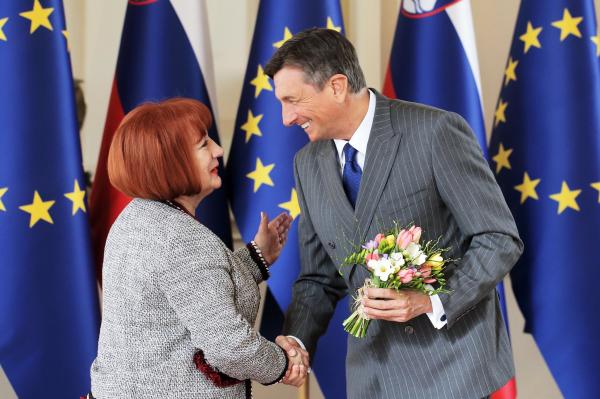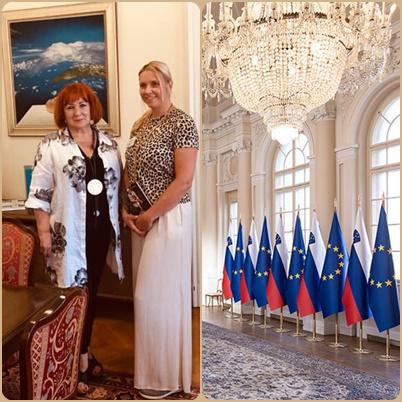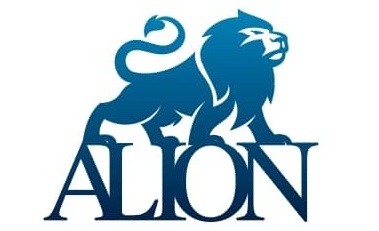FORMAL MEETING AT THE PRESIDENTAL PALACE
Rights Advocates in Conversation: Vlasta Nussdorfer (Former Ombudsman & Presidential Advisor) and Animal Rights Activist Tyasha Alion Explore Contemporary Animal Welfare Challenges and Achievements
Date: July 30, 2019
Location: Presidential Palace, Ljubljana, Slovenia
Meeting Type: High-level governmental consultation on animal welfare policy
Government Representative: Vlasta Nussdorfer
- Former Human Rights Ombudsman of Slovenia
- Current Official Advisor to President Borut Pahor
- Recognized advocate for animal rights legislation
Alion Institute Delegation:
Tyasha Alion - Animal Rights Activist and Institute Representative
Bojan Mavrič - Alion Institute Strategic Coordinator
Location: Presidential Palace, Ljubljana, Slovenia
Meeting Type: High-level governmental consultation on animal welfare policy
Government Representative: Vlasta Nussdorfer
- Former Human Rights Ombudsman of Slovenia
- Current Official Advisor to President Borut Pahor
- Recognized advocate for animal rights legislation
Alion Institute Delegation:
Tyasha Alion - Animal Rights Activist and Institute Representative
Bojan Mavrič - Alion Institute Strategic Coordinator


This summary provides an overview of the discussions and outcomes from the recent Presidential Advisory Meeting focused on the critical topics of animal rights and environmental stewardship. The meeting aimed to address current challenges, share insights, and develop actionable strategies that align with our commitment to promoting ethical treatment of animals while fostering sustainable environmental practices.
Immediate Implementation Priorities are:
- Updating animal protection laws to address contemporary challenges
- Strengthening authorities' capacity to respond to animal welfare violations
- Incorporating animal welfare education into national curricula
Immediate Implementation Priorities are:
- Updating animal protection laws to address contemporary challenges
- Strengthening authorities' capacity to respond to animal welfare violations
- Incorporating animal welfare education into national curricula
Tyasha was discussing some pressing issues related to animal welfare and the environment. Intensive farming practices lead to animal suffering and harm the environment, posing public health risks.
It’s vital to protect farm animals to address problems like climate change and water pollution. Tyasha also touched on wildlife conservation in Slovenia, noting that habitat destruction and climate change pose significant threats to many native species. Protecting wildlife is essential for maintaining ecological balance.
Lastly, Tyasha expressed her concerns about domestic animals, highlighting the inadequate laws and increasing cases of abandonment and abuse. ‘The way we treat these animals reflects our values and commitment to the environment, ’ she said. It was a thought-provoking discussion about how interconnected these issues are!
It’s vital to protect farm animals to address problems like climate change and water pollution. Tyasha also touched on wildlife conservation in Slovenia, noting that habitat destruction and climate change pose significant threats to many native species. Protecting wildlife is essential for maintaining ecological balance.
Lastly, Tyasha expressed her concerns about domestic animals, highlighting the inadequate laws and increasing cases of abandonment and abuse. ‘The way we treat these animals reflects our values and commitment to the environment, ’ she said. It was a thought-provoking discussion about how interconnected these issues are!


Conclusion & Answer
The July 30, 2019, Presidential Palace meeting established a crucial precedent: animal rights advocacy receives the highest levels of governmental attention when framed as an environmental necessity and a moral imperative.
Key Wisdom: "Protecting animals is not separate from protecting the environment - it is the foundation of environmental protection."
Presidential advisory engagement legitimizes animal welfare as an essential component of national environmental policy.
The established relationship between the Alion Institute and Slovenia's highest governmental levels creates ongoing opportunities for policy influence and advancement in environmental protection.
1) Tyasha addresses critics who argue that focusing on animal rights distracts from urgent human issues like poverty and healthcare. She believes that advocating for animal welfare can coexist with these concerns, as promoting empathy can inspire broader social action that benefits both animals and humans.
2) In response to those who worry that stricter animal welfare laws could harm agricultural economies and food prices, Tyasha acknowledges potential short-term challenges. However, she emphasizes that the long-term benefits, such as sustainable farming and improved product quality, are crucial for the agricultural sector's future.
3) Tyasha also responds to claims that technological solutions for animal welfare may lead to over-reliance on systems instead of fostering human empathy. She argues that technology can enhance our connection with animals while complementing our compassion and direct action, offering new ways to improve animal welfare.
The July 30, 2019, Presidential Palace meeting established a crucial precedent: animal rights advocacy receives the highest levels of governmental attention when framed as an environmental necessity and a moral imperative.
Key Wisdom: "Protecting animals is not separate from protecting the environment - it is the foundation of environmental protection."
Presidential advisory engagement legitimizes animal welfare as an essential component of national environmental policy.
The established relationship between the Alion Institute and Slovenia's highest governmental levels creates ongoing opportunities for policy influence and advancement in environmental protection.
1) Tyasha addresses critics who argue that focusing on animal rights distracts from urgent human issues like poverty and healthcare. She believes that advocating for animal welfare can coexist with these concerns, as promoting empathy can inspire broader social action that benefits both animals and humans.
2) In response to those who worry that stricter animal welfare laws could harm agricultural economies and food prices, Tyasha acknowledges potential short-term challenges. However, she emphasizes that the long-term benefits, such as sustainable farming and improved product quality, are crucial for the agricultural sector's future.
3) Tyasha also responds to claims that technological solutions for animal welfare may lead to over-reliance on systems instead of fostering human empathy. She argues that technology can enhance our connection with animals while complementing our compassion and direct action, offering new ways to improve animal welfare.
